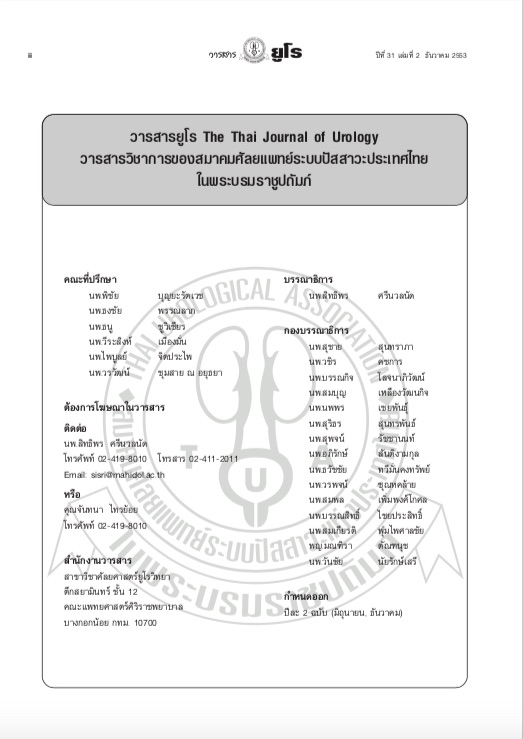Quinolone Treatment in High Serum Prostate Specific Antigen in Patient with Pathological Prostatitis
Keywords:
quinolone, high serum, prostate specific antigen, pathological, prostatitisAbstract
Introduction: High prostate specific antigen (PSA) is the most common indication for prostatic biopsy to detect prostate cancer in Chulalongkorn hospital. However, this procedure has some complications such as pain, bleeding and septicemia. In some high PSA patients require more than once of biopsy, if the pathologic report is benign or inflammation. Thus the author assume that quinolone treatment should be treat in patient with pathological prostatitis inflammation before taking next serum PSA. It should be decrease if the patient has alone prostatitis inflammation.
Methods: The present study recruited 79 males with pathological prostatitis who had high PSA. Patient was randomized to 2 groups. The first group had quinolone treatment for 4 weeks and the other had no treatment. PSA change after 3 month was evaluated and compared.
Results: 66% of patient response to antibiotic treatment. PSA in treatment group was significantly decreased with mean PSA difference -1.60+3.48 ng/ml (p=0.007). Mean PSA difference of control group was 0.38+1.94 ng/ml (p= 0.22). There was no significant change of PSA in control group.
Conclusion: Quinolone treatment in pathological prostatitis statistically significant reduce serum PSA. Patient who have prostatitic inflammation should treat with quinolone before taking next serum PSA. It may reduce unnecessary biopsy.
References
Nickel JC, True LD, Krieger JN, Berger RE, Boag AH, Young ID. Consensus development of a histopathological classification system for chronic prostatic inflammation. BJU Int 2001; 87: 797-805.
Smith DS, Catalona WJ, Herschman JD. Longitudinal screening for prostate cancer with prostate-specific antigen. JAMA 1996; 276: 1309-15.
Nadler RB, Humphrey PA, Smith DS, Catalona WJ, Ratliff TL. Effect of inflammation and benign prostatic hyperplasia on elevated serum prostate specific antigen levels. J Urol 1995; 154: 407-13.
Socher S, OûLeary MP, Richie JP. Prevalence of prostatitis in men undergoing biopsy for elevated PSA or abnormal digital rectal exam. J Urol 1996; 155 (Suppl.): 425A.
Hasui Y, Marutsuka K, Asada Y, Ide H, Nishi S, Osada Y. Relationship between serum prostate specific antigen and histological prostatitis in patients with benign prostatic hyperplasia. Prostate 1994; 25: 91-6
Bjerklund Johansen TE, Grüneberg RN, Guibert J, Hofstetter A, Lobel B, Naber KG et al. The role of antibiotics in the treatment of chronic prostatitis: a consensus statement. Eur Urol 1998; 34: 457-66.
Bundrick W, Heron SP, Ray P, Schiff WM, Tennenberg AM, Wiesinger BA et al. Levofloxacin versus ciprofloxacin in the treatment of chronic bacterial prostatitis: a randomized double-blind multicenter study. Urology 2003; 62: 537-41.
Schaeffer AJ, Wu SC, Tennenberg AM, Kahn JB. Treatment of chronic bacterial prostatitis with levofloxacin and ciprofloxacin lowers serum prostate specific antigen. J Urol 2005;174:161-4.
Schaeffer AJ. Clinical practice. Chronic prostatitis and the chronic pelvic pain syndrome. N Engl J Med 2006 Oct 19; 355: 1690- 8.
Movin T, Gad A, Güntner P, Földhazy Z, Rolf C. Pathology of the Achilles tendon in association with ciprofloxacin treatment. Foot Ankle Int 1997; 18: 297-9.
Pierfitte C, Gillet P, Royer RJ. More on fluoroquinolone antibiotics and tendon rupture (Letter). N Engl J Med 1995; 332:193 12. Caleb B, Brett S, James A. Treatment of chronic prostatitis lowers serum prostate specific antigen. J Urology 2002; 167: 1723-6. 13. Kobayashi M, Nukui A. Serum PSA and percent free PSA value changes after antibiotic treatment. Urol Int 2008; 80186-92.



